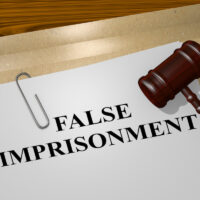CA Penal Code 236 and 237: False Imprisonment

California Penal Code Section 236 sets out California’s prohibition on false imprisonment. Broadly, PC 236 defines “false imprisonment” as “the unlawful violation of the personal liberty of another.” False imprisonment is meant for circumstances where a person restrains or holds another person against their will, but the severity of the crime does not amount to kidnapping. In such circumstances, the defendant can be charged under section 236 or 237.
Elements of False Imprisonment
To convict on a charge of false imprisonment, the prosecution must prove two specific elements:
- The defendant intentionally and unlawfully restrained, detained, or confined another person.
- The defendant’s actions prevented that person from moving freely.
Regarding the first element: The defendant must have intentionally prevented someone else from moving freely and willfully. The defendant must have specifically intended to do the predicate act that led to restraining the person. If the defendant did something accidentally, or through an act of negligence, and that caused a person to be detained, then the defendant is not guilty of false imprisonment.
False imprisonment does not require that the defendant physically hold or tie down the victim. If the defendant locks someone in a room or prevents them from moving freely by threatening them with a dangerous weapon, they can still be convicted of false imprisonment.
Regarding the second element: The defendant must have prevented a person from moving freely by either preventing the victim from exercising their free will to leave a particular location or by purposefully transporting the victim to another location without their consent. Threatening someone, using coercion or fraud, or moving someone who is unable to consent (such as a minor child or an adult lacking mental capacity), may all be used in demonstrating that the victim did not consent.
Defenses to a Charge of False Imprisonment
There are a few potential defenses to a charge of false imprisonment. These defenses undermine one or more of the elements required for a conviction:
- The defendant lawfully detained the victim, for example, if the defendant witnessed the victim committing a crime and held them for the police. California law allows civilians to perform a “citizen’s arrest” if they witness someone commit a crime.
- The defendant acted in good faith. This may occur if, for example, the defendant reasonably believed the victim was a danger either to oneself or someone else. For example, if someone threatens to kill oneself or someone else, it may be reasonable to restrain them.
- The victim was acting voluntarily. If the defense can show that the defendant did nothing to “force” the victim to stay or to move to a new location, and that the victim was otherwise not being held against their will, then the defendant is not guilty.
Penalties for Violating PC 236-237
PC 237 sets the penalty for violating section 236. False imprisonment is known as a “wobbler,” meaning that it can be charged as a misdemeanor or as a felony depending on the circumstances of the crime. The misdemeanor offense is punishable by a maximum one year in county jail, a $1,000 fine, or both. If a defendant is convicted of felony false imprisonment, they face a county jail term of either 16 months, two years, or three years.
In order to trigger felony false imprisonment, the defendant must have committed the offense by way of violence, menace, fraud, or deceit. The threat of physical violence is sufficient; the defendant need not actually have committed a violent act. Additionally, if the defendant committed false imprisonment of an elder or dependent adult by way of violence, menace, fraud, or deceit, they can be convicted of a felony and face imprisonment for two, three, or four years.
The Law Offices of John D. Lueck is a trusted Rancho Cucamonga criminal defense law firm with more than 42 years of service to clients in San Bernardino and Los Angeles counties. These cases are highly sensitive and require experienced representation to ensure your rights are protected. If you or someone you know has been arrested for a crime, contact Rancho Cucamonga criminal defense lawyer John D. Lueck at 909-484-1963 for a free consultation.
